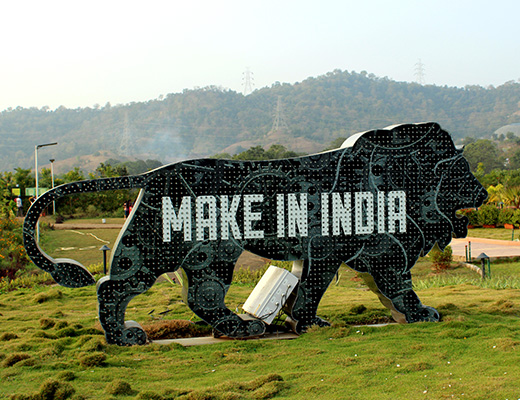Make in India
Make in India

Make in India is a major national programme of the Government of India designed to facilitate investment, foster innovation, enhance skill development, protect intellectual property and build best in class manufacturing infrastructure in the country. The primary objective of this initiative is to attract investments from across the globe and strengthen India’s manufacturing sector. It is being led by the Department for Promotion of Industry and Internal Trade (DPIIT), Ministry of Commerce and Industry, Government of India.
Prime Minister of India, Mr Narendra Modi, while introducing the programme in his maiden Independence Day speech from the ramparts of the Red Fort on August 15, 2014, said “I want to tell the people of the whole world: Come, make in India. Come and manufacture in India. Go and sell in any country of the world but manufacture here. We have skill, talent, discipline and the desire to do something. We want to give the world an opportunity that come make in India,” The initiative was formally introduced on September 25, 2014, by Mr Modi at Vigyan Bhawan, New Delhi, in the presence of business giants from India.
The Make in India programme is important for the economic growth of India as it aims at utilising the existing Indian talent base, creating additional employment opportunities and empowering secondary and tertiary sector. The programme also aims at improving India’s rank on the Ease of Doing Business index by eliminating the unnecessary laws and regulations, and by making the bureaucratic processes easier transparent, responsive and accountable. As a result of these initiatives, India's position in the World Bank's Doing Business Report (DBR) improved significantly, climbing from 142nd place in 2014 to 63rd in the 2020 report.
Over the past decade, the "Make in India" initiative has significantly boosted domestic manufacturing, attracting foreign investments, and fostering innovation. It has led to the creation of millions of jobs and enhanced skill development, contributing to economic growth. The initiative has also strengthened India's position as a global manufacturing hub, particularly in sectors like electronics and automobiles. Overall, it has played a pivotal role in transforming India's industrial landscape and enhancing its competitiveness on the world stage.
The Make in India initiative has experienced remarkable success, largely due to a surge in Foreign Direct Investment (FDI) inflows. FDI inflows have shown a consistent upward trend, escalating from US$ 45.14 billion in 2014-15 to a record high of US$ 70.95 billion in 2023-24.
The focus of Make in India 2.0 programme is on 27 sectors. These include automobiles, aerospace, automobile components, aviation, biotechnology, chemicals, construction, defence manufacturing electrical machinery, electronic systems, food processing, gems and jewellery, IT & BPM, leather, media and entertainment, mining, oil and gas, pharmaceuticals, ports and shipping, railways, renewable energy, roads and highways, space, textile and garments, thermal power, tourism and hospitality and wellness.
The dedicated website for this initiative (www.makeinindia.com) not only showcases the 27 sectors but also puts focus on opportunities, policies and Ease of Doing Business. The Investor Desk is an integral part of this website, which aims at providing all information/data analysis to investors across sectors.
Please visit https://www.pmindia.gov.in/en/major_initiatives/make-in-india/ for more details.




